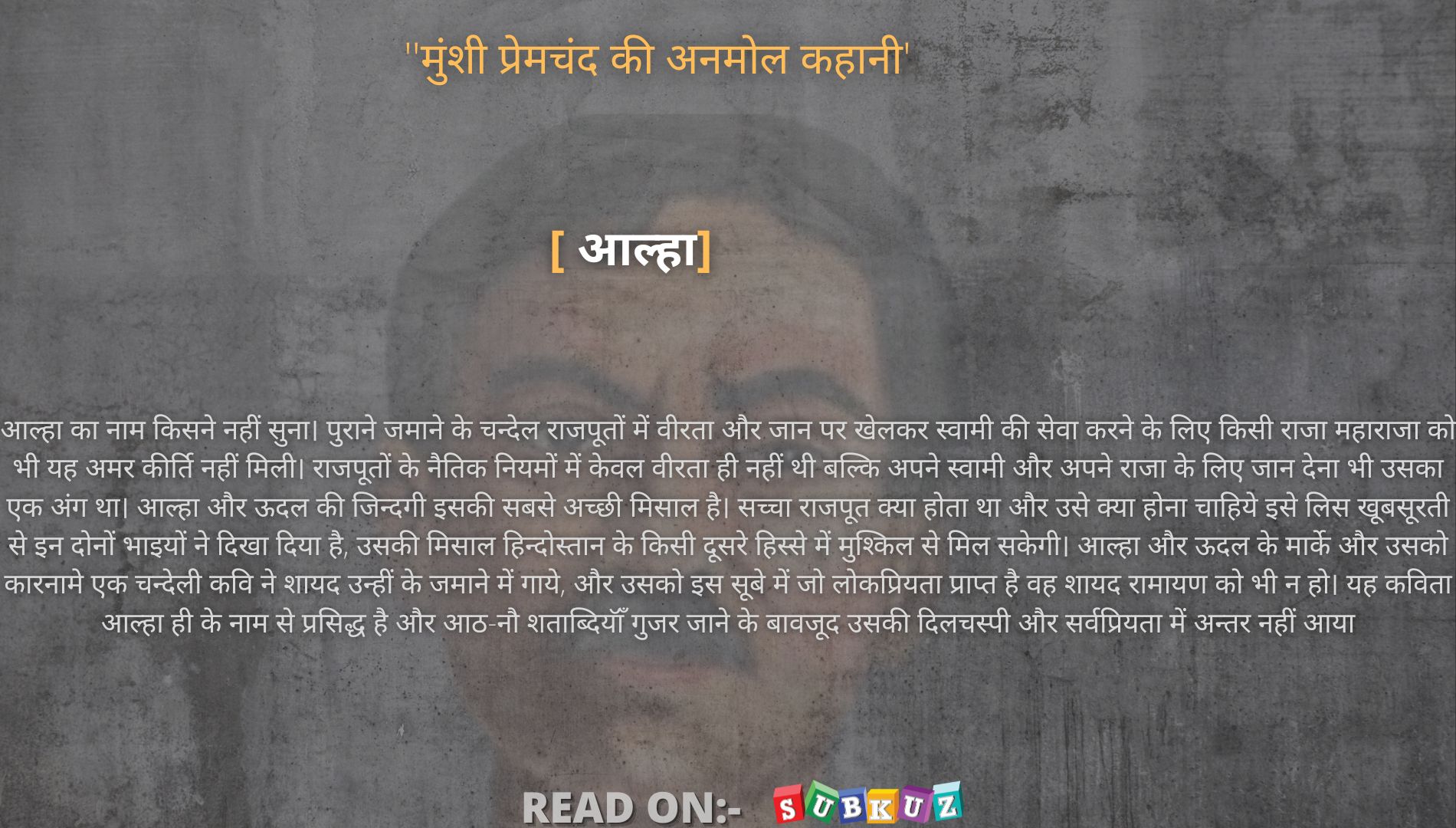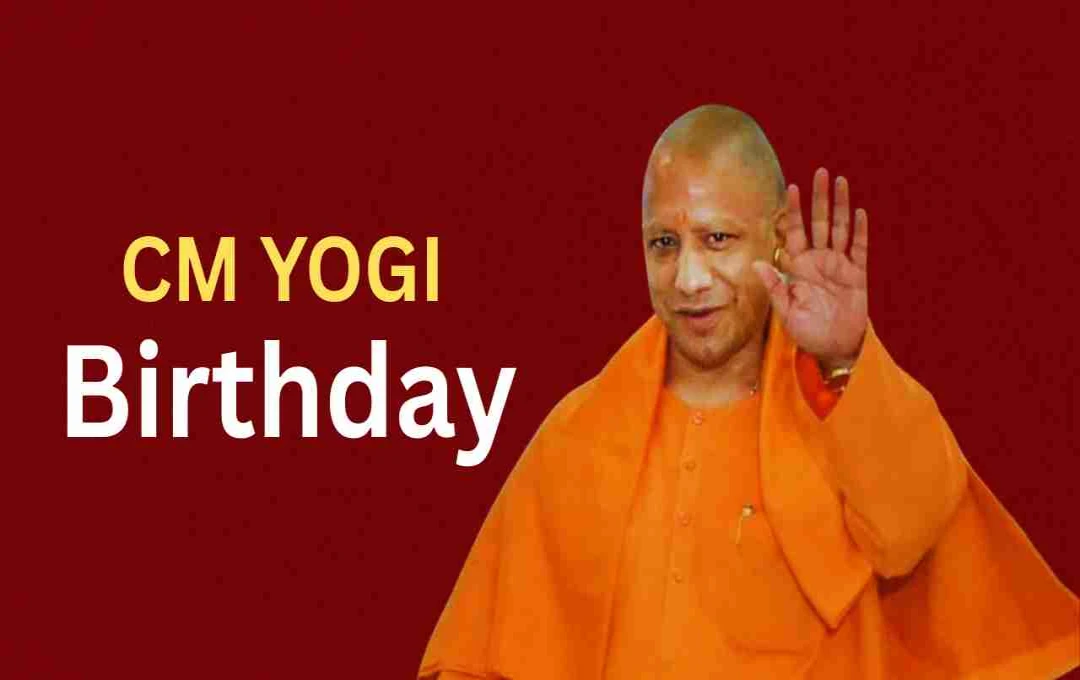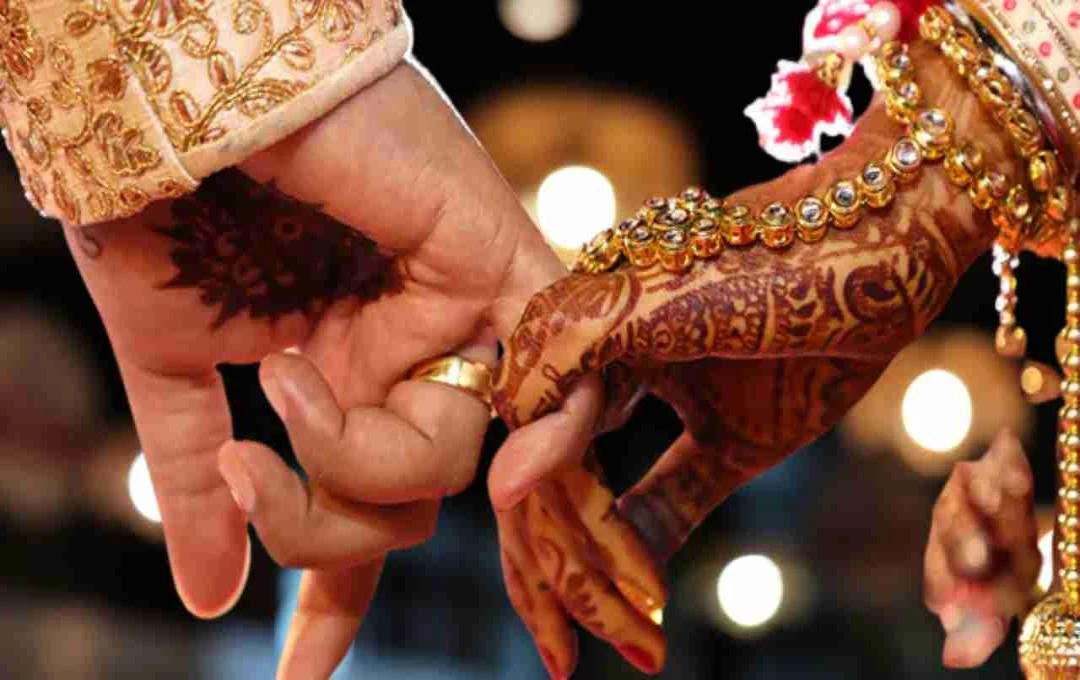Friends, our country has for centuries been the birthplace and abode of numerous great men, brimming with virtues – sages, poets, writers, musicians, and many more. Thousands of works created by these luminaries are invaluable. Today's youth, in this digital age, seem to be losing touch with their heritage and are drifting far from this precious treasure. subkuz.com consistently strives to bring you these invaluable treasures, along with entertaining stories, news, and information from India and around the world. Presented here is one such invaluable and inspiring story by Munshi Premchand.
Alha
Who hasn't heard the name Alha? Even among the Chandela Rajputs of old, such valor and self-sacrifice in the service of one's lord was unparalleled. Rajput ethics encompassed not only bravery but also the willingness to lay down one's life for one's king and master. The lives of Alha and Udal perfectly exemplify this. They beautifully illustrated what a true Rajput was and should be, a standard rarely matched elsewhere in India. A Chandela poet, perhaps from their own time, composed ballads of Alha and Udal's exploits, enjoying a popularity in this region that perhaps even the Ramayana doesn't rival. This poetry, known as the Alha, remains captivating and beloved even after eight or nine centuries.
Singing Alha is a major custom in this region. In villages, thousands gather to listen. Even in cities, these gatherings sometimes appear. This story is more popular among the common people than the elite. Attend any gathering; thousands sit on the ground, completely engrossed, as the Alha singer, perched on a raised platform, performs. His voice rises and falls, but when he describes battles and preparations, the flow of words, the gestures of his hands and expressions, the rhythmic beat of the dhol, and the precise delivery of heroic verses – a unique feature of battle poetry – all combine to stir a surge of masculine enthusiasm in the hearts of the listeners. The narrative style is simple, engaging, and easily understandable. The simplicity of the descriptions and emotions is the essence of artistic beauty.
Raja Paramaladeva was the last king of the Chandela dynasty. At the beginning of the 13th century, the dynasty ended. Mahoba, a small town then, was the Chandela capital. Mahoba's kingdom bordered Delhi and Kannauj. Alha and Udal were honored members of Raja Paramaladeva's court. Both brothers were still children when their father, Jasraj, was killed in battle. The king, taking pity on the orphans, brought them to the royal palace and entrusted them to his queen, Malinha. The queen raised and nurtured them like her own son. As young men, these two brothers became renowned for their bravery throughout the world. Their valor brought glory to Mahoba.
The great warriors of Mahoba,
Whose strength was unmatched.
Alha and Udal were always ready to sacrifice their lives for Raja Paramaladeva. Queen Malinha had raised them, arranged their marriages, and nurtured them. This loyalty, combined with the favors received, made the two brothers devoted protectors of the Chandela king and faithful servants of Raja Paramaladeva. Due to their bravery, hundreds of arrogant kings in the surrounding areas submitted to the Chandelas. The boundaries of the Mahoba kingdom expanded like a flood, and the Chandela power grew from a crescent moon to a full moon. These two warriors never rested. They yearned to demonstrate their prowess on the battlefield. They found no sleep on comfortable beds, and the era itself was filled with unrest. In those days, to live peacefully was to disappear from the world. Swords clashed and rivers of blood flowed at the slightest provocation. Even marriages became like bloody battles, the birth of a daughter becoming a calamity; thousands of soldiers, chiefs, and relatives had to be sacrificed as dowry.
Alha's maternal uncle, Mahil, was a black-hearted man, harboring malice. The brothers' prestige and power were thorns in his heart. His life's ambition was to somehow bring their greatness to ruin. He dedicated his life to this "noble" task. He made countless attempts, set fires repeatedly, until his insidious machinations finally intoxicated Raja Paramala. Even iron can be cut by water.
One day, Raja Paramala was sitting alone in court when Mahil arrived. Noticing Mahil's somber expression, the king asked, "Brother, why do you look so downcast?" Tears welled up in Mahil's eyes. The control a deceitful man exerts over his emotions is challenging, even for a great yogi. His heart weeps, but his lips smile; his heart enjoys pleasures, but his eyes cry; his heart burns with resentment, yet honeyed words flow from his tongue.
Mahil said, "Your Majesty, living in your shadow, I desire nothing more, but the ingratitude and rebelliousness of those whom you have raised from dust to the heavens, who have become powerful through your grace, cause me great sorrow."
Paramala asked in surprise, "Are there such people among those who have eaten my salt?"
Mahil replied, "Your Majesty, I cannot say anything. Your heart is an ocean of kindness, but a ferocious crocodile has crept into it."
"Who is it?"
"I am."
Raja Paramala exclaimed in astonishment, "You!"
Mahil, "Yes, Your Majesty, that unfortunate person is I. I have come before you today to plead my own case. My duty towards my relatives is nothing compared to my devotion to you. Alha is a piece of my liver; his flesh is my flesh, and his blood is my blood. But when a disease arises in one's body, one must reluctantly speak to a physician. Alha is intoxicated by his wealth. He has developed the false notion that this kingdom stands only because of my strength."
Raja Paramala's eyes turned red. He said, "I have always considered Alha my son."
Mahil, "More than a son."
Paramala, "He was an orphan, with no protector. I raised him, nurtured him. I gave him estates, made him the commander of my army. I shed the blood of twenty thousand Chandela warriors at his wedding. His mother and my Malinha have slept embraced for years. Can Alha forget my kindness? Mahil, I cannot believe what you are saying."
Mahil's face turned pale, but he composed himself and said, "Your Majesty, a lie has never left my lips."
Paramala, "How can I trust you?"
Mahil whispered something in the king's ear.
Alha and Udal were practicing چوگان (a polo-like game). Thousands watched the spectacle in the vast field. The ball bounced erratically. A guard arrived and said, "The Maharaja requests your presence."
Alha was suspicious. Why was the Maharaja summoning him at this unusual hour? The game stopped. The ball was given respite from the blows. He immediately went to court with the guard, bowed, and paid his respects.
Paramala said, "I ask something of you. Will you grant it?"
Alha simply replied, "Command me."
Paramala, "You will not refuse?"
Alha glanced at Mahil, understanding that something was amiss. Why the smile on his face? Why these flowers on the fig tree? Is my loyalty being tested? He said with passion, "Your Majesty, I am unaccustomed to hearing such questions from you. You are my protector, my nourisher, my king. At your command, I can leap into fire and fight death. By your order, I can make the impossible possible. Do not ask me such questions."
Paramala, "Excellent, I expected as much from you."
Alha, "What is your command?"
Paramala, "You have the Nahar horse?"
Alha said "Yes," and looked at Mahil with furious eyes.
Paramala, "If you don't mind, lend it to me for my ride."
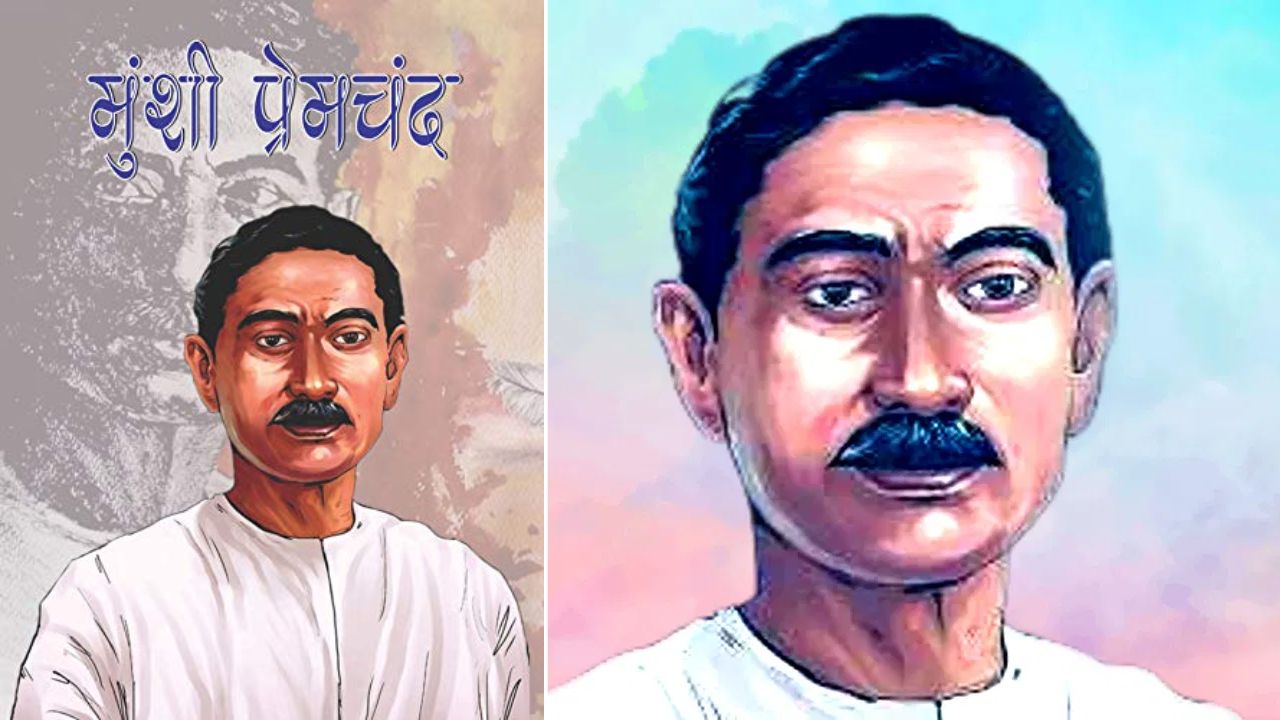
Alha remained speechless, pondering. I have promised not to refuse. I have lost the argument. I shouldn't refuse. Surely, my loyalty is being tested. It's not a big deal. But how can I refuse and not be called disloyal? My relationship with the king is not merely that of master and servant; I have played in his lap. When my hands were weak and I couldn't stand on my feet, he endured my antics. Can I refuse?
His thoughts shifted: Granted, the king's kindness is countless; every hair on my body is burdened by his favors. But a Kshatriya never gives his mount to another. It is not the dharma of Kshatriyas. I am raised and indebted to the king. I have dominion over my body; I can sacrifice it to the king. But I have no control over Rajput dharma; I cannot break it. Those who have considered the fragile threads of dharma as walls of iron have made the name of the Rajputs shine. Should I forever stain myself? Ah! Mahil has me firmly trapped. A ferocious lion is in front; a deep abyss behind. I must either endure humiliation or be called ungrateful. I must either sink the name of the Rajputs or be ruined. Well, whatever God wills. I accept being called ungrateful, but not being humiliated. I accept ruin, but not betraying Rajput dharma.
Alha bowed his head, lost in these thoughts. This was a trial, his future dependent on his success.
But for Mahil, this was not a test of his patience.
The day arrived that he had awaited, his eyes never tiring. This flood of happiness now eroded the iron wall of restraint. The victory of a weak man over a perfected yogi was underway. Suddenly, Paramala asked Alha in a loud voice, "What are you hesitating about? Don't you want to give it?"
Alha looked the king in the eye and said, "No."
Paramala was enraged and snapped, "Why?"
Alha answered with unwavering resolve, "It is not the dharma of Rajputs."
Paramala, "Is this the reward for my kindness? You know what you were before and what you are now."
Alha, "Yes, I know."
Paramala, "I made you, and I can undo you."
Alha could no longer contain himself. His eyes turned red, and his brow furrowed. He spoke sharply, "Your Majesty, I will always be grateful for your kindness. A Kshatriya never forgets a favor. But if you have shown kindness, I have also served you tirelessly. The sense of duty and loyalty alone cannot generate the devotion that I have repeatedly shown. But well, now I am convinced that my place is not in this court. Accept my final respects, and forgive any mistakes born of my foolishness."
Looking towards Mahil, he said, "Uncle, from today, the blood tie between us is broken. If you thirst for my blood, I am your enemy."
Alha's mother's name was Deval Devi. She was one of those courageous, high-minded women who made India's past so inspiring. Even in that dark age, when a terrible flood of internal strife and hatred swept the country, India produced such women who could illuminate the darkest pages of history. Deval Devi's eyes filled with tears as she heard what Alha had done to preserve his honor. She embraced both her sons, saying, "My sons, you have done what was the dharma of Rajputs. I am fortunate to have sons like you who uphold the family's honor."
That day, the two brothers left Mahoba, taking only their swords and horses. They left behind all their possessions. A soldier's wealth and honor are his sword. He who possesses the wealth of valor needs no other wealth.
It was the rainy season; rivers and streams were swollen. The earth, overflowing with Indra's generosity, could not contain itself. The melodious calls of peacocks echoed through the trees, and carefree farmers, intoxicated by the serenity of the fields, hummed the Malhar tune. The lush greenery of the hills, the mirror-like surface of the water, and the natural embellishments of wild creepers and plants showered youthfulness upon nature. The cool breeze of the plains, the sweet fragrance of wildflowers, and the swaying colorful crops of the fields stirred a storm of desires in hearts. In this auspicious season, Alha bid a final farewell to Mahoba. Tears streamed down the brothers' faces as they left their homeland. In these very streets, they had learned to walk; in these very ponds, they had sailed paper boats; here they had enjoyed the carefree pleasures of youth.
Their ties were now severed forever. The two brothers moved forward, but very slowly. They thought that perhaps Paramala had sent a trusted man to reconcile with them. They held their horses, but when the last trace of Mahoba's hills vanished from their sight, so did the last glimmer of hope. They, who had no country, took a deep breath and urged their horses onward. News of their exile spread quickly. Every court welcomed them; messages arrived from all sides. Jayachandra, the king of Kannauj, sent his prince to meet them. What the messages failed to achieve, this meeting accomplished. The prince's hospitality and welcome drew the two brothers to Kannauj. Jayachandra, eagerly awaiting their arrival, appointed Alha as his commander-in-chief.
After Alha and Udal's departure, Mahoba descended into various forms of darkness. Paramala was a weak ruler. Subordinate kings raised the banner of rebellion. There was no power left to control these warring factions. Some of Prithviraj's army from Delhi, victorious in a battle, was returning. They made camp in Mahoba. It doesn't take long for swords to clash amongst hot-headed soldiers. Whether it was the insolence of Raja Paramala's courtiers or the Chauhaans' soldiers, a conflict erupted between the Chandelas and the Chauhans. A battle began. The Chauhans were outnumbered. The Chandelas, disregarding the rules of hospitality, quenched their thirst for blood with the blood of the Chauhans, not realizing that attacking a small band of soldiers would bring calamity upon the entire country, staining innocent blood.
When Prithviraj received this heartbreaking news, his anger knew no bounds. Like a storm, he descended upon Mahoba, devastating Sironj, a famous town in Mahoba, and advanced towards Mahoba. The Chandelas also assembled their army, but their morale crumbled in the first encounter. Without Alha and Udal, the army was like a wedding procession without the groom. The entire army scattered. Panic gripped the country. Fear of Prithviraj's imminent arrival paralyzed the people. Paramala deeply regretted his actions, but regret was futile. Seeing no other option, he pleaded with Prithviraj for a one-month truce. The Chauhan king never disregarded the rules of war. His valor did not allow him to attack a weak, unsuspecting, or unprepared enemy. If he hadn't been so strictly bound by these rules, he wouldn't have faced such a dire fate at the hands of Shahabuddin. His bravery proved to be his undoing. He accepted Paramala's message, reviving the spirits of the Chandelas.
Consultations began on how to confront Prithviraj. Queen Malinha also participated in these deliberations. Someone suggested building a high wall around Mahoba; another proposed abandoning Mahoba and fleeing south. Paramala said nothing, but surrender seemed his only option. Then Queen Malinha stood up and said:
"Chandela Rajputs, what childish talk is this? Will you stop the enemy by building a wall? Does a broom stop a storm? You advise abandoning Mahoba and fleeing. Such cowardly advice is given by women. Where is all your bravery and self-sacrifice? Not long ago, kings trembled at the name of the Chandelas. The Chandelas' reputation was formidable; you won hundreds of battles in a few years, you never lost. The gleam of your swords never dimmed. You are still the same, but you lack that spirit. That spirit left Mahoba with the brave Alha. With Deval Devi's displeasure, Chandika Devi is also displeased with us. If anyone can salvage this losing game, it is Alha. Only those two brothers can save you at this critical juncture. Persuade them, reason with them. Mahoba has a great claim on them. They were raised by the soil and water of Mahoba. They cannot forget Mahoba's claim. God has given them strength and knowledge; only they can shoulder the burden of victory."
Queen Malinha's words resonated with the people.
Jagna Bhat set out to bring Alha and Udal from Kannauj. The two brothers were going hunting with Prince Lakhan when Jagna arrived and offered his greetings. Worry and hesitation were evident on his face. Alha nervously asked, "Poet, how did you find your way here? Is all well in Mahoba? Why have you remembered us poor folk?"
Tears welled up in Jagna's eyes as he said, "If all were well, why would I come seeking your refuge? One remembers the Gods only in times of trouble. Indra's wrath has fallen upon Mahoba. Prithviraj Chauhan is besieging Mahoba. Narsingh and Virsingh have fallen in battle. Sironj lies in ashes. The Chandela kingdom is on the brink of ruin. The entire country is in turmoil. A month's respite was secured with great difficulty, and Raja Paramala sent me to you. In this time of trouble, we have no helper, no one to bolster our courage. Since you left Mahoba, there is no one to inspire us."
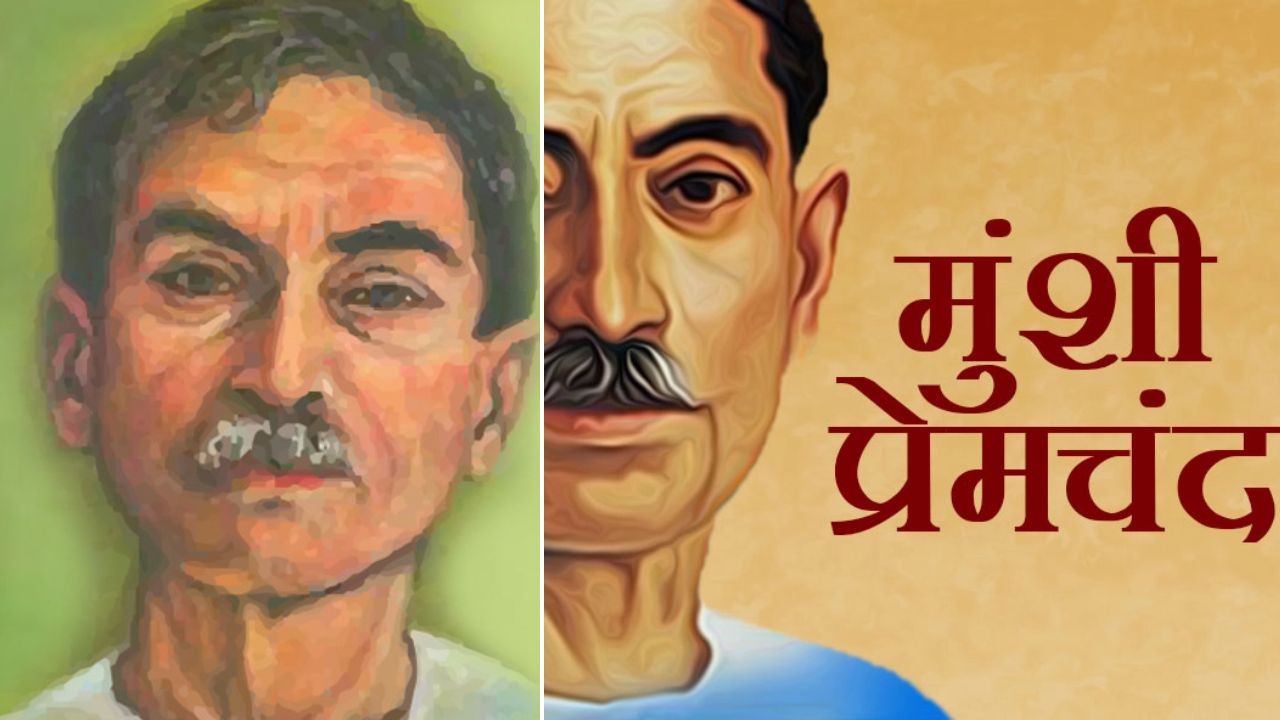
Since you severed ties with Mahoba, Raja Paramala has not smiled. The Paramala whose sadness worried you, his eyes have been dry for months. Queen Malinha, in whose lap you played, weeps day and night for you. From her window, she gazes towards Kannauj, watching for your return. O sons of the brave Alha! The Chandela boat is sinking. The name of the Chandelas is about to be erased. Now is the time to take up your swords. If you do not save the sinking boat at this juncture, you will always regret it, for your name and that of your famous father will also sink with it.
Alha replied coldly, "We care nothing for this now. Our name and our father's name sank the day we were driven from Mahoba like dogs. Let Mahoba perish, let the Chandelas be extinguished; we care nothing now. Was this the reward for our services? Our father sacrificed his life for Mahoba, we defeated the Gurjars and made the Chandelas masters of Devgarh. We fought the Yadavas and planted the Chandela flag in the battlefield of Kathiyar. I, with these very hands, stopped the advancing wave of the Kachwahas. We won the battle of Gaya, broke the pride of Rewa. I extracted tribute from Mewat. We did all this, and this is our reward? My father subjugated ten kings. In the service of Paramala, I received seven life-threatening wounds, three times escaping death. I fought forty battles and never lost. Udal won seven bloody battles. We sounded the drum of Chandela valor. We raised the name of the Chandelas to the heavens, and this is what we receive? Why doesn't Paramala now call upon that same traitor, Mahil, to help him, for whose pleasure I was exiled?
Jagna replied, "Alha! This is not the talk of Rajputs. The kingdom for which your father sacrificed his life is now trampled under the feet of the enemy. As his sons, does your blood not boil? A Rajput who abandons his king in distress has no place but hellfire. The shadow of ruin has fallen on your motherland. Your mother and sisters are targets for the lustful eyes of enemies. Does your blood not boil now? Can you sleep peacefully in Kannauj, seeing this plight of your country?"
Deval Devi heard of Jagna's arrival. She immediately summoned Alha and said, "Son, forget past grievances and prepare to leave for Mahoba today."
Alha remained speechless, but Udal retorted angrily, "We cannot go to Mahoba. Have you forgotten the day we were driven out like dogs? Let Mahoba sink or swim; our heart is filled with it; we have no desire to see it again. Now Kannauj is our motherland."
The Rajput woman could not bear to hear such wicked words from her son. In a fit of anger, she said, "Udal, are you not ashamed to utter such words? I wish God had kept me barren, that I would not have borne such sons. Was it for these sons who would bring shame to the name of the brave Alha that I endured the pain of childbirth? Worthless ones, get away from me. Do not show your face to me. You are not Jasraj's sons; the man from whom you were born cannot be Jasraj."
This was a stinging rebuke. Shame caused both brothers to break out in a sweat. Both stood up and said, "Mother, stop. We cannot bear to hear more. We will go to Mahoba today and offer our blood in the service of Raja Paramala. We will illuminate our father's name with the gleam of our swords on the battlefield. We will show our prowess in the face of the Chauhans and immortalize the name of Deval Devi's sons."
Both brothers departed from Kannauj, with Deval Devi accompanying them. When the estranged ones reached their motherland, water fell on the withered crops, and broken spirits were revived. One hundred thousand Chandelas stood to welcome these warriors. After many days, they met these two brothers, long separated from their homeland. Tears of joy flowed from their eyes. Raja Paramala, upon hearing news of their arrival, came on foot to Kiratsagar. Alha and Udal ran to him and embraced his feet. Tears streamed from all three's eyes, and all grievances were washed away.
The enemy stood at the gate; there was no time for much hospitality. At Kiratsagar, Alha was appointed commander-in-chief after consultation with the country's leaders and court officials. Oaths to fight to the death were exchanged. The brave warriors swore to retreat only in death. They embraced, ready to face their fate. That day, there were no signs of sadness on anyone's face; women laughed as they bid farewell to their loved ones; men laughed as they parted from their wives, because this was the final battle; victory meant life, and defeat meant death.
Near the place where a town now stands, the two armies clashed, and for eighteen days, the battle raged fiercely. A great battle took place. Prithviraj himself participated. Both sides fought valiantly. The warriors gave their all, and the armies on both sides perished. Of three hundred thousand men, only three survived: Prithviraj, Chanda Bhat, and Alha. Such a terrifying, relentless, and decisive battle may never have been seen in any country or age. Both lost and both won. The Chandelas and Chauhans were forever lost, for the outcome of the battle of Thanesar was also decided in this field. The experienced soldiers among the Chauhans were used at Oudh. When faced with Shahabuddin, inexperienced soldiers were brought to the battlefield, and the result was inevitable. Alha's whereabouts remained unknown; he either drowned in shame or became an ascetic.
The common belief is that he is still alive. People say he became immortal. This is quite right, for Alha is indeed immortal; he can never be erased, his name will forever endure.
Thus ends this inspiring story by the great writer Munshi Premchand. This story teaches us many new things. The entire subkuz team strives to bring inspiring stories to its visitors every day. Continue reading such inspiring and enriching stories on subkuz.com.
